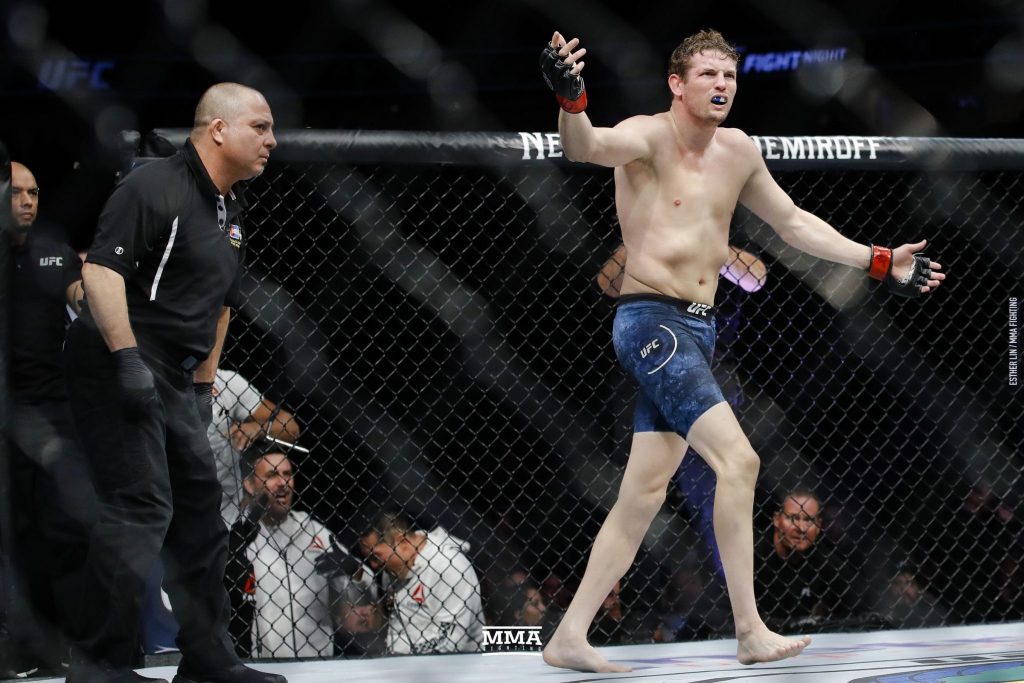
Last Saturday’s UFC 25th anniversary show on paper looked like just another weekly show.
There were no major championship fights, or even showdowns that will determine next title contenders. But when the night was over, it was one of the more memorable nights of the year. There were the nostalgia pieces, history pieces, clips from UFC 1 and even retro graphics and music to differentiate this from the usual weekly show.
The show will best be remembered for perhaps the greatest finish of a UFC fight in history withYair Rodriguez’s upwards elbow at the buzzer that gave him a knockout win over Chan Sung Jung in a fight he was a split-second away from losing via decision. There was Donald Cerrone ending up with two of the most important records in company history — most all-time wins and most all-time finishes — holding his four-month son in the air while getting showered with the night’s biggest ovation, and in the process opening up a very interesting debate if he has had a Hall of Fame-worthy career.
But something more important long-term took place in a preliminary card match: The disputed finish of Bobby Moffett’s win over Chas Skelly. It’s about the future of the role of instant replays in MMA.
Instant replay being used in the sport is relatively new and still rare. In this case, Moffett clamped a D’Arce choke on Skelly in the second round. Skelly was twisting to keep the pressure off. Referee Tim Mills thought Skelly went out and stopped the fight. Skelly was furious.
Viewers were then treated to watching Mills view the finish several times over on the replay, declaring each time that Skelly’s arm went limp, and he upheld his original decision.
The problem was, the evidence was less than clear that was the right call. Most viewers seemed to see it as a premature stoppage, and the person reviewing the stoppage was the person who made the original call, and was just looking to defend it. Whether right or wrong as far as Mills’ judgment went, to the outside viewer, it looked like a flawed system that mistreated Skelly.
Skelly was adamant he never went out, and was defending well at the time of the stoppage. It certainty appeared the stoppage was premature, as Skelly responded instantly, but it was a judgment call. While the replay seemed to favor Skelly in the argument, it was not enough for Mills to overturn his original ruling. And even if it had, the fight was still over.
One of the biggest issues with MMA in North America today is the lack of unified rules, which has to do with a relatively young and changing sport, and the setup where each state commission has its own governing body of regulators. Instant replay rules vary from state to state, from being allowed to be used to not. They also will vary among shows because a top UFC and Bellator show will have a full crew taping with multiple camera angles, while smaller shows will have more limited angles to view from.
Last year, the Association of Boxing Commissions and Combative Sports (ABC) approved a rule that replays can be used, but only to review fight-ending sequences. It’s up to the referee to determine if he should check a replay. The rules were not put in place with a Moffett vs. Skelly type of controversy in mind. They were put in place more so to allow referees to determine whether a legal blow ended the fight, and if the fight-ending blow was in fact illegal, whether it should be ruled as a no contest or a disqualification.
From second guessing that ruling, it’s not much of a step for fighters who believe a fight was prematurely stopped for strikes would have the same complaint, but all stoppages are different and one rule doesn’t fit all cases.
The argument is that a choke for an added second or so is not as dangerous as a submission that could cause an injury, such as an armbar, or repeated punches or elbows when a fighter isn’t defending himself.
A key argument for this very limited use of replays is to not bog down the shows with replay stoppages during fights that break up the flow of the action.
Still, the object of regulation should be making things as fair as possible for the fighters and the fans when it comes to fighting within the allowable rules. Perhaps the idea of referees being able to use it between rounds to determine fouls would be of benefit, but any changes in the sport are going to be baby steps most of the time, due to the state commission system.
The problem on Saturday is that the referee who made the original call was also the one to decide the outcome of the call. That shouldn’t be the case because it is too easy to look for something, even the smallest thing, for someone to confirm they made the correct ruling. If an outside party was looking at things, they may go in with a clearer head. And there is still the unusual politics involved regarding commissions not wanting to overturn the decision of a commission-appointed referee, because it’s a repudiation of the referee they assigned in the first place.
Skelly could appeal, but we’ve seen few cases where that works, because again, it’s going to be decided by a commission that is likely to back up its referee. Skelly also noted that if Moffett were to lose his win bonus, he didn’t want to appeal. The reality is, the only end results of an appeal would be a ruling that Moffett still won, or a no-contest ruling that in theory would take Moffett’s win bonus away.
In this situation, it’s probably best for UFC to just book a rematch between the two.
As we go forward, the mentality should be far less about protecting a bad call because overturning a call does make the original ruling look bad. Everyone knows the referee’s job is difficult, needing to make split-second decisions. We have to accept human error as part of the officiating process, but that doesn’t mean if there is a mistake it shouldn’t be rectified and that human error should be the end of the discussion.
Wins and losses often don’t only lead to the winner doubling his pay, but they also lead to the loser being robbed of income when it comes to future bookings.
Another issue is what would happen if Mills, or someone else looking at the replay, decided that Skelly was correct, that he was defending effectively and the fight should not have been stopped. That is likely the correct ruling, but in doing so, the fight would be declared a no-contest because there is nothing in the rule book that would allow the referee to look at the tape and decide that the stoppage was incorrect, and then restart the fight.
There is no fair answer here, but in a situation like this, restarting the fight would seem like the best ruling of all.
That also has its problems.
You can’t really have Moffett put Skelly back in a D’Arce choke on the ground and restart things from that position. But still, stopping the fight was unfair to Skelly. Restarting the fight in a neutral position would have been unfair to Moffett because he was in a very advantageous position. But a no-contest ruling satisfies nobody.
Going forward, the best rule would be that the referee should have the right to call for usage of a replay between rounds. And if there is a question about the end of the fight, there should be bylaws that allow for an outside party to view the replay and latitude to allow restarts if the commission feels that is the most fair option given the circumstances.
Let’s look at show Fortunes changed for five stars of Saturday’s show.
YAIR RODRIGUEZ — Rodriguez (12-2) won a war in a fashion that should make him a bigger star going forward. Still, the reality is he was losing the fight and won this time because the sport is sometimes a game of inches, as opposed to proving who is actually the superior overall fighter.
Rodriguez is an exciting fighter with only one loss in the UFC, to Frankie Edgar. He should remain fighting name competition in a division filled with action fighters. Michael Johnson (19-13) andCub Swanson (25-10) are both potential fighters he could face next.
CHAN SUNG JUNG — “The Korean Zombie” (14-5) has made a career of exciting fights dating back to his WEC coming out party against Leonard Garcia, which is still one of the greatest fights in modern MMA. He should also be in there with name fighters because the loss shouldn’t hurt his ability to fight high on cards. A good next opponent for him, as far as being a name fighter, would be Gilbert Melendez (22-7).
DONALD CERRONE — Cerrone (34-11, 1 no contest) said he is moving back to lightweight after going 6-4 at welterweight, and that a big fight is waiting for him in that division. A big fight at lightweight immediately conjures up images of Conor McGregor and Khabib Nurmagomedov. Cerrone very clearly does not deserve a lightweight title shot ahead of Tony Ferguson or Dustin Poirier.
A fight with McGregor has its appeal. The most logical fighter for McGregor would be Georges St-Pierre, if St-Pierre is willing and the payday is such that it’s hard to think he wouldn’t be. It would have the most intrigue and easily do the most business, probably no worse than the second biggest pay-per-view numbers in history. It also doesn’t compromise the championship. But whoever wins can very rightly get a championship fight next, which would be another huge business fight.
But aside from St-Pierre or Nate Diaz, Cerrone seems as good a business choice for McGregor as anyone. But if it’s not a red panty night for Cerrone, the lightweight division has plenty of fighters that Cerrone could face and on paper provide major action fights. In that regard, the most notable name would be Poirier (24-5). And a win over Poirier would get him immediately in the title mix.
GERMAINE DE RANDAMIE — de Randamie (8-3) followed up becoming the first UFC featherweight champion with a win over Raquel Pennington via decision in somewhat of a lackluster fight. Pennington didn’t have the speed to strike nor could she take de Randamie down, but was able to neutralize her in the clinch enough to slow the fight down.
Given that Pennington was Amanda Nunes’ last title challenger, the win should put de Randamie as one of the two clear title contenders to face Nunes after her Dec. 29 fight with Cris Cyborg. Her next opponent could be Ketlen Vieira (10-0) in a fight where the winner gets the title shot. If they just go with the idea of Vieira getting the next shot after already getting wins over Sara McMannand Cat Zingano, then de Randamie should face Aspen Ladd (7-0), a matchup where the winner could be next in line.
MAYCEE BARBER — The 20-year-old Barber (6-0), in her first UFC fight, made an immediate impression with her win over Hannah Cifers. Fighting in her home state, she got a huge reaction coming out, perhaps second to only Cerrone. She then scored a dominant second-round win.
She talked her way into being somebody by telling the television audience that if you want to see a champion, follow my career, and then challenged MacKenzie Dern (7-0), who is one of the most talked about fighters in the strawweight division. She also pushed that she wants main card fights, not prelims. Even before the fight, she was talking of her attempts to get a fight with Dern before both were in the UFC.
Barber used her first UFC exposure to try and jump on a fight with one of the most talked about fighters in the strawweight division, since Dern came in heavily acclaimed from her world championships in jiu-jitsu. But Dern is still untested at the highest level of MMA and Barber is a viable opponent.
The one question surrounding the fight is weight. Barber is fighting at strawweight. Dern has missed 115 in three of her six fights at that weight, and given that she weighed in last time at 123, she probably needs to move up to flyweight.
Otherwise, it’s a great example of a fighter trying to break out of the pack by telling people the short-term direction she wants to take her career. If she gets that fight, it will be one of the more talked about fights on whatever show it’s on. Barber easily could have been just another winner of a UFC fight and be just another name on the card in her next few fights had she not shown that initiative, and it’s a lesson for everyone starting their UFC careers.

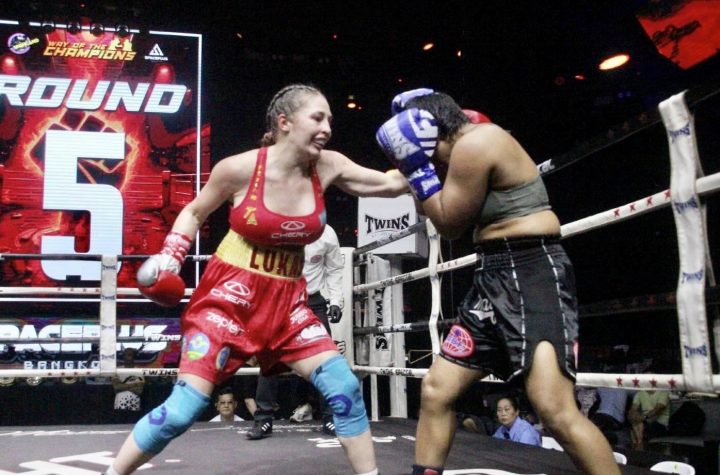
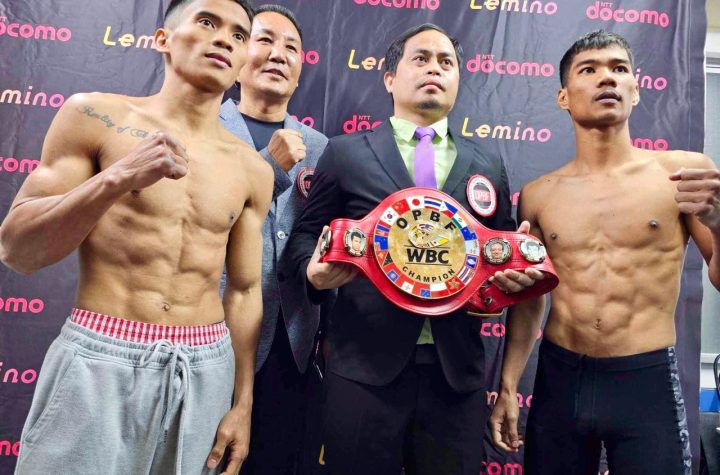
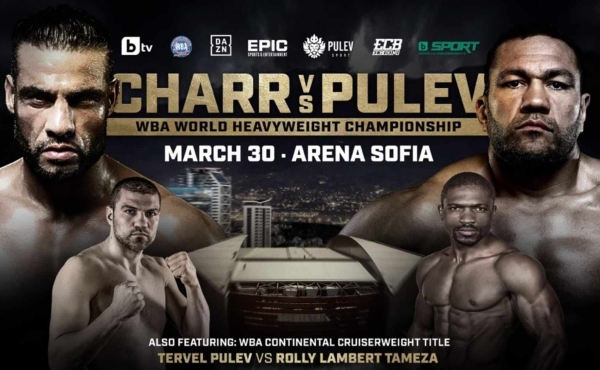
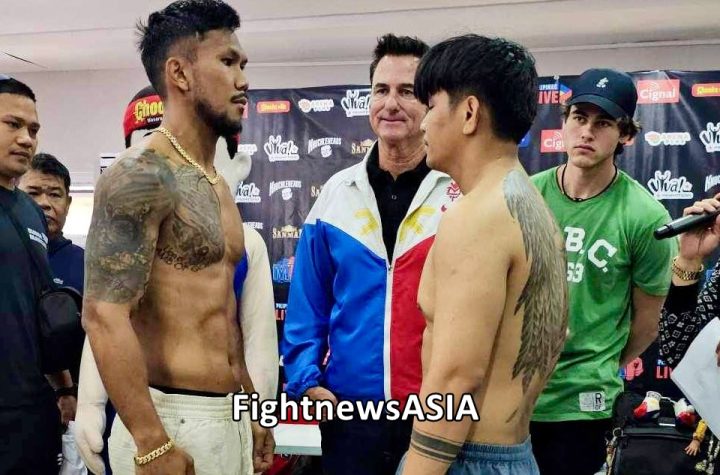
More News
Quiñonero fights Verdadero in Resbak 2
Resbak 2 at Malungon, Sarangani Province on July 12
Garde stops Baliente in 1st round in “Resbak”